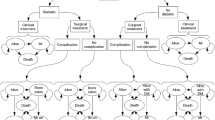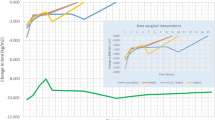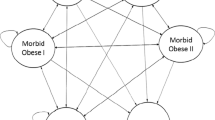Abstract
Objective
This study aimed to evaluate the cost-effectiveness of bariatric surgery (BS) compared to non-surgical treatment (NST) in Korean people with morbid obesity according to comorbidities and body mass index (BMI) severity.
Methods
The target cohort was people with morbid obesity, defined as BMI of ≥ 35 kg/m2, or obese people with BMI of 30–34.9 kg/m2 having obesity-related comorbidities. A decision-tree model for 1-year obesity treatment and Markov model for the rest of life were used. In the decision-tree model, the comorbidity remission rate and BMI change after 1-year treatment were decided based on a prospective clinical trial. In the Markov model, the transition probabilities were calculated considering the BMI level and age. The starting age of 20 years, a cycle length of 1 year, a time horizon of 80 years, and a 5% discount rate were applied for the base case from the healthcare system perspective.
Results
In the base case, BS improved quality-adjusted life years (QALYs) and was the cost-effective option in total cohort (incremental cost-effectiveness ratio of BS vs. NST was 674 USD/QALY). It was shown to be cost-effective in all subgroup analyses based on BMI level. In particular, BS was a dominant alternative for the subgroup with basal BMI of 35.0–37.4 kg/m2. Various sensitivity analyses showed the robustness of results indicating the cost-effectiveness of BS.
Conclusion
BS at BMI of > 30 kg/m2 was more effective than NST for a reduction in BMI and remission of obesity-related comorbidities and was cost-effective in Korea.



Similar content being viewed by others
References
Global Health Risks: Mortality and Burden of Disease Attributable to Selected Major Risks: World Health Organization; 2009.
Berrington de Gonzalez A, Hartge P, Cerhan JR, et al. Body-mass index and mortality among 1.46 million white adults. N Engl J Med. 2010;363(23):2211–9.
Seidell JC, Halberstadt J. The global burden of obesity and the challenges of prevention. Ann Nutr Metab. 2015;66(Suppl 2):7–12.
Xu H, Cupples LA, Stokes A, et al. Association of Obesity with mortality over 24 years of weight history: findings from the Framingham Heart Study. JAMA Netw Open. 2018;1(7):e184587.
Wang J, Thornton JC, Russell M, et al. Asians have lower body mass index (BMI) but higher percent body fat than do whites: comparisons of anthropometric measurements. Am J Clin Nutr. 1994;60(1):23–8.
Gallagher D, Heymsfield SB, Heo M, et al. Healthy percentage body fat ranges: an approach for developing guidelines based on body mass index. Am J Clin Nutr. 2000;72(3):694–701.
Deurenberg-Yap M, Yian TB, Kai CS, et al. Manifestation of cardiovascular risk factors at low levels of body mass index and waist-to-hip ratio in Singaporean Chinese. Asia Pac J Clin Nutr. 1999;8(3):177–83.
Pacific WHOROftW. The Asia-pacific perspective: redefining obesity and its treatment. Sydney: Health Communications Australia; 2000.
Collaboration NCDRF. Worldwide trends in body-mass index, underweight, overweight, and obesity from 1975 to 2016: a pooled analysis of 2416 population-based measurement studies in 128.9 million children, adolescents, and adults. Lancet. 2017;390(10113):2627–42.
Shin HY, Kang HT. Recent trends in the prevalence of underweight, overweight, and obesity in Korean adults: the Korean National Health and Nutrition Examination Survey from 1998 to 2014. J Epidemiol. 2017;27(9):413–9.
Park S, Pi S, Hwang J, et al. Effects of initial body mass index and weight change on all-cause mortality: a 10-year cohort study in Korea. Asia Pac J Public Health. 2018;30(3):217–26.
Jaacks LM, Vandevijvere S, Pan A, et al. The obesity transition: stages of the global epidemic. Lancet Diabetes Endocrinol. 2019;7(3):231–40.
Chung W, Lim SJ, Lee S, et al. Gender-specific interactions between education and income in relation to obesity: a cross-sectional analysis of the Fifth Korea National Health and Nutrition Examination Survey (KNHANES V). BMJ Open. 2017;7(12):e014276.
Fried M, Hainer V, Basdevant A, et al. Interdisciplinary European guidelines on surgery of severe obesity. Obes Facts. 2008;1(1):52–9.
Fisher BL, Schauer P. Medical and surgical options in the treatment of severe obesity. Am J Surg. 2002;184(6B):9S–16S.
Cheng J, Gao J, Shuai X, et al. The comprehensive summary of surgical versus non-surgical treatment for obesity: a systematic review and meta-analysis of randomized controlled trials. Oncotarget. 2016;7(26):39216–30.
Chang SH, Stoll CR, Song J, et al. The effectiveness and risks of bariatric surgery: an updated systematic review and meta-analysis, 2003-2012. JAMA Surg. 2014;149(3):275–87.
Avenell A, Robertson C, Skea Z, et al. Bariatric surgery, lifestyle interventions and orlistat for severe obesity: the REBALANCE mixed-methods systematic review and economic evaluation. Health Technol Assess. 2018;22(68):1–246.
Alsumali A, Al-Hawag A, Samnaliev M, et al. Systematic assessment of decision analytic models for the cost-effectiveness of bariatric surgery for morbid obesity. Surg Obes Relat Dis. 2018;14(7):1041–59.
Ohta M, Seki Y, Wong SK, et al. Bariatric/metabolic surgery in the Asia-Pacific region: APMBSS 2018 survey. Obes Surg. 2019;29(2):534–41.
Gaeun Kim SJ, Choi Y-B, Hur Y, et al. Is surgery necessary for morbid obesity patient? NECA round-table conference consensus statement. Korean J Obes. 2013;22(1):7–12.
Song HJ, Kwon JW, Kim YJ, et al. Bariatric surgery for the treatment of severely obese patients in South Korea--is it cost-effective? Obes Surg. 2013;23(12):2058–67.
Comparative study in morbidity obese patient with surgical and medical treatments: effectiveness, safety and cost-effectiveness R&D Report. Korean Ministry of Health and Welfare Affairs. Korea Health Industry Development Institute.; Available from: https://www.khidi.or.kr/kps/researchInfo/list?menuId=MENU02230&searchContinuStYear=&searchSprcRsrhInttNm=&searchFlnmKrn=&searchGwrd=&searchPjtMngmNo=HC15C1322&searchPjtNm=#.
Korean Ministry of Health and Welfare Affairs. Korea Centers for Disease Control. Korean National Health and Nutritional Examination Survey (2007-2015). Available from: https://knhanes.cdc.go.kr/knhanes/main.do.
Sjostrom L. Review of the key results from the Swedish Obese Subjects (SOS) trial - a prospective controlled intervention study of bariatric surgery. J Intern Med. 2013;273(3):219–34.
Song HJ, Hwang J, Pi S, et al. The impact of obesity and overweight on medical expenditures and disease incidence in Korea from 2002 to 2013. PLoS One. 2018;13(5):e0197057.
Seong SC, Kim YY, Park SK, et al. Cohort profile: the National Health Insurance Service-National Health Screening Cohort (NHIS-HEALS) in Korea. BMJ Open. 2017;7(9):e016640.
Statistics Korea (2016). Available from: http://kostat.go.kr. Accessed in 3 Dec 2018.
Sung KC, Ryu S, Cheong ES, et al. All-cause and cardiovascular mortality among Koreans: effects of obesity and metabolic health. Am J Prev Med. 2015;49(1):62–71.
Health Insurance Review and Assessment Service. Available from: http://www.hira.or.kr/main.do. Accessed in 3 Dec 2018.
Healthcare Bigdata Hub. Available from: https://opendata.hira.or.kr.
Song HJ, Lee EK. Evaluation of willingness to pay per quality-adjusted life year for a cure: a contingent valuation method using a scenario-based survey. Medicine (Baltimore). 2018;97(38):e12453.
Sjostrom L, Peltonen M, Jacobson P, et al. Bariatric surgery and long-term cardiovascular events. JAMA. 2012;307(1):56–65.
Sierzantowicz R, Lewko J, Hady HR, et al. Effect of BMI on quality of life and depression levels after bariatric surgery. Adv Clin Exp Med. 2017;26(3):491–6.
Zachariah SK, Chang PC, Ooi AS, et al. Laparoscopic sleeve gastrectomy for morbid obesity: 5 years experience from an Asian center of excellence. Obes Surg. 2013;23(7):939–46.
Zhang Y, Zhao H, Cao Z, et al. A randomized clinical trial of laparoscopic Roux-en-Y gastric bypass and sleeve gastrectomy for the treatment of morbid obesity in China: a 5-year outcome. Obes Surg. 2014;24(10):1617–24.
Hatoum IJ, Blackstone R, Hunter TD, et al. Clinical factors associated with remission of obesity-related comorbidities after bariatric surgery. JAMA Surg. 2016;151(2):130–7.
Puzziferri N, Roshek 3rd TB, Mayo HG, et al. Long-term follow-up after bariatric surgery: a systematic review. JAMA. 2014;312(9):934–42.
Sach TH, Barton GR, Doherty M, et al. The relationship between body mass index and health-related quality of life: comparing the EQ-5D, EuroQol VAS and SF-6D. Int J Obes. 2007;31(1):189–96.
Doring N, de Munter J, Rasmussen F. The associations between overweight, weight change and health related quality of life: longitudinal data from the Stockholm Public Health Cohort 2002-2010. Prev Med. 2015;75:12–7.
Song HJ, Lee EK, Kwon JW. Gender differences in the impact of obesity on health-related quality of life. Asia Pac J Public Health. 2016;28(2):146–56.
Tang Q, Sun Z, Zhang N, et al. Cost-effectiveness of bariatric surgery for type 2 diabetes mellitus: a randomized controlled trial in China. Medicine (Baltimore). 2016;95(20):e3522.
Acknowledgments
We thank the Health Insurance Review and Assessment Service (HIRA-NPS) for providing data for this study.
Funding
This study was funded by a grant from the Korea Health Technology R&D Project through the Korea Health Industry Development Institute (KHIDI), funded by the Ministry of Health and Welfare, Republic of Korea (grant number HC15C1322) and the Korea National Research Foundation (grant number NRF-2018R1D1A3B07047356).
Author information
Authors and Affiliations
Corresponding author
Ethics declarations
Conflict of Interest
The authors declare that they have no conflict of interest.
Ethical Approval
The study was approved by the IRB of the Kyungpook National University (KNU 2016–0007). In addition, prospective clinical trials for the source data in this study were approved by the Institutional Review Board (IRB) of their respective centers (the approval number of IRB at principal investigator center: INHAUH 2016-06-015).
Informed Consent
The NHIS-HEALS database was retrospectively established in an anonymous format, and the informed consent requirement for this study was waived, and informed consent was obtained from all individual participants included in the prospective clinical trial used for source data in this study.
Additional information
Publisher’s Note
Springer Nature remains neutral with regard to jurisdictional claims in published maps and institutional affiliations.
Rights and permissions
About this article
Cite this article
An, S., Park, HY., Oh, SH. et al. Cost-effectiveness of Bariatric Surgery for People with Morbid Obesity in South Korea. OBES SURG 30, 256–266 (2020). https://doi.org/10.1007/s11695-019-04122-w
Published:
Issue Date:
DOI: https://doi.org/10.1007/s11695-019-04122-w




